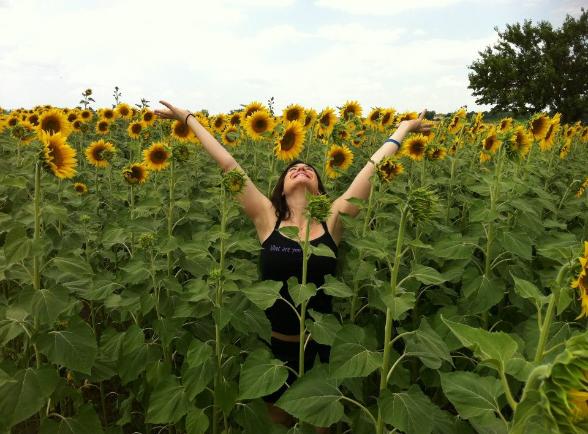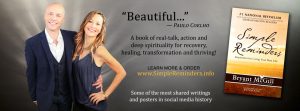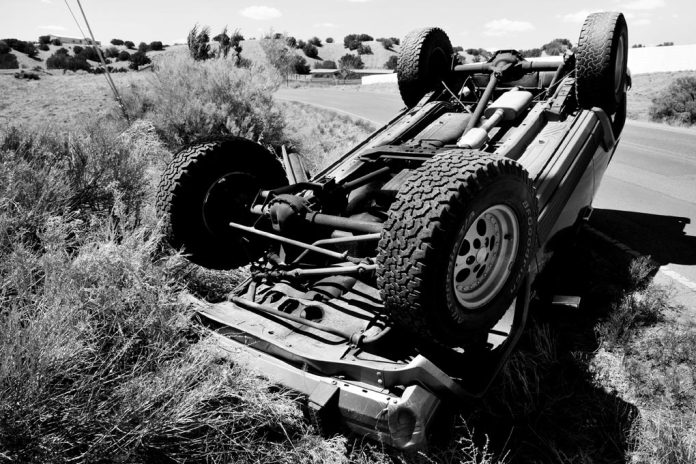My daughter stands in the middle of a shallow pond, yelling, “If you love me, come and get me! Do you want me? Do you care?” I rest in a patch of shade, watching hordes of children and chaperones traipsing over a wooden bridge; an epileptic girl who fainted at the old schoolhouse, her face weary, limbs floppy in the aftermath; hearing-impaired students in red t-shirts, marching single file, absorbing this living-history museum with their turbo eyes, fingers dancing shadow puppets between them.
“Fine then Mom! I guess I’ll have to stay here . . . Forever! . . . Way past midnight!”
The tremor in her voice tells me there’s sand itching in her socks. Cicadas buzz in the cottonwood trees, volume cranked to unbearable. A canker sore stings her gums. Lunch uneaten. All factors tipping us towards melt-down. A teacher calls, “Time to go, kids!” I wave at the 2nd grade class as they jostle back to the bus. A boy asks, “Why does she get to stay in the water?”
I drove my daughter separately, in case she got wet and muddy, or needed to leave the field trip early. Water usually calms her, but today she’s rocking, hands in tight fists, moaning, “You have to come get me . . . “
I peel off my boots, roll up my jeans, and approach her, soothing, “It’s okay . . . I do want you . . . Please, let’s go.” She grabs my waist and holds tight, pretending she can’t walk. Words like ‘manipulation’ and ‘discipline’ flash across my mind (residue from my spare-the-rod-spoil-the-child upbringing). I’m triggered by her anxious questions: what is love what is want what is care?
She’s silent when I say, “I love you.” (But at least she doesn’t reply, “I don’t love you!” like years past.)
I escort her through heat and blowing dust, and “I’m tired!” towards the parking lot. She asks, “Can we can stop at the library on our way home?” I agree, and remind myself to breathe.
Reality feels slippery after a tantrum. Memories of previous episodes conglomerate in my ribcage, taunting: out-of-control! I judge the day’s events while driving. Pond, yelling, and desperation. Mother frazzled and inept. I give my daughter a carton of almond milk, and fumble the radio, finding her favorite country music station.
Yellow lines blur around a sharp bend. Oncoming vehicle red or orange spooks me and I swerve my Jeep off the road. Slow motion skid on dirt, hello sagebrush, windshield shattering. We’re crashing, tipping, rolling. My arm reaches out to protect her, and I promise, “WE ARE OKAY. WE ARE NOT HURT.”
And she believes me.
Hanging upside-down like bats. My legs pretzel the steering wheel. Engine sounds wrong, so I turn the key. Undo her seatbelt. She falls to the ceiling, surrounded by nuggets of turquoise glass. I say: “We had an accident, but we’re safe!“ She glows with surprise and says, “That felt like zero gravity!” I wonder why I don’t feel sorry. Why we’re not crying. Why all of this feels right somehow.
In our Autistic world, where a rogue t-shirt-tag causes hysterics, and a lost pencil, paroxysm—this crash is a bizarre relief. The crisis is not just in her head, or in her body. It’s crunched metal, wheels spinning in the air—us folded together in a cave-like capsule—where time pauses briefly.
Inverted and suspended, I see her from a new perspective. Dim light from the rear window illuminates a sprinkling of freckles across her cheeks, neon hearts on her dress, and a pink straw hat—still on!—cord tied under her chin. I smile and touch her arm, reveling in the strange intimacy. This may be the closest I’ve ever felt to my child.
“Will we get out of here Mom?”
“Yes . . . “ I say. “Be careful! Let me help you.”
Then outside voices and gloves open a door and untangle my limbs, pulling my legs breech onto the pavement. I grasp my daughter’s hand, and guide her out of the wreck. I hold her close, anchoring us flesh-to-flesh.
Police cars and fire trucks arrive at the scene. She gazes at the flashing lights and commotion, and says, “All these people came to help us? It’s nice of them to care . . .” A paramedic kneels and asks, “How old are you?”
“I’m eight!” He checks her spine, looks for cuts, quizzes name and birthday, and “How old are you?” She laughs. “Eight! I’m still eight!” Turns to me: “Mom? Why does he keep asking me that?”
She’s peeved when my boyfriend comes to retrieve us, because “his car smells like a thousand skunks!” She complains, “We never went to the library!” and I promise, “Another day . . . “
At bedtime, she climbs onto my lap for a gentle hug. (A rare occurrence. Hugs usually turn into rowdy wrestling, with her pleading, “Squeeze me! Tighter. Tighter!”) I cradle her, thankful for this unexpected rock-a-bye.
“You believe in seatbelts, right Mom? Now we know how they work! And how bats feel!” We chat about flying mammals, laws of motion, and “lucky-we-weren’t-hurt!”
She asks, “Which do you think was better: the field trip or the car crash?”
I think of Temple Grandin’s words: Up is down, and down is up. I mumble into my daughter’s hair, “Both?” “But Mom, which one was better? You have to pick!” Calamity tossing and tumbling us to this place called peace.
We both agree: the accident wins.

Jennifer Pastiloff is part of the faculty in 2015 at Other Voices Querétaro in Mexico with Gina Frangello, Emily Rapp, Stacy Berlein, and Rob Roberge. Please email Gina Frangello to be accepted at ovbooks@gmail.com. Click poster for info or to book. Space is very limited.
Anna Yarrow is an international photographer, writer, and teacher, based in Santa Fe, New Mexico. Registration is now open for her fall online classes: The Unveiled Eye (Creative Photography & Writing) and Sleeping Ink (Artistic Expression for Parents of Special Needs Kids). Her daughter made it safely to age 9, and mentions the accident often, saying, “I wish we could do that again…”

Jen Pastiloff’s events and workshops listed here.



Very, very beautiful writing. Thank you for sharing that story about you and your daughter, I enjoyed it very much.
Wow, this one opens my eyes to something I didn’t understand quite as well, until after reading it. What a gift you give by writing in a way that can open eyes and facilitate understanding.
Scary but so, so glad that everyone was okay. I can almost relate to the way in which obvious crisis (the crash) allowed for temporary peace from inner crisis, the most isolating kind. This story illustrates that so well for me. Peaceful wishes to you and all who relate, thanks for sharing!